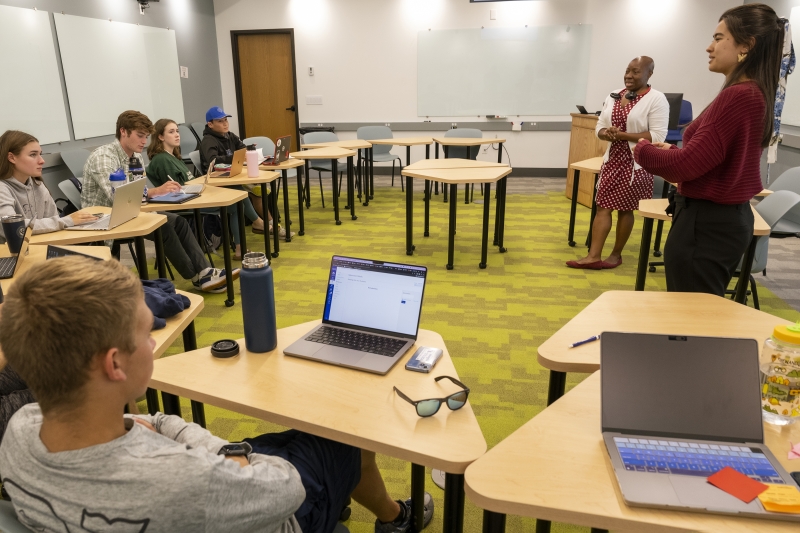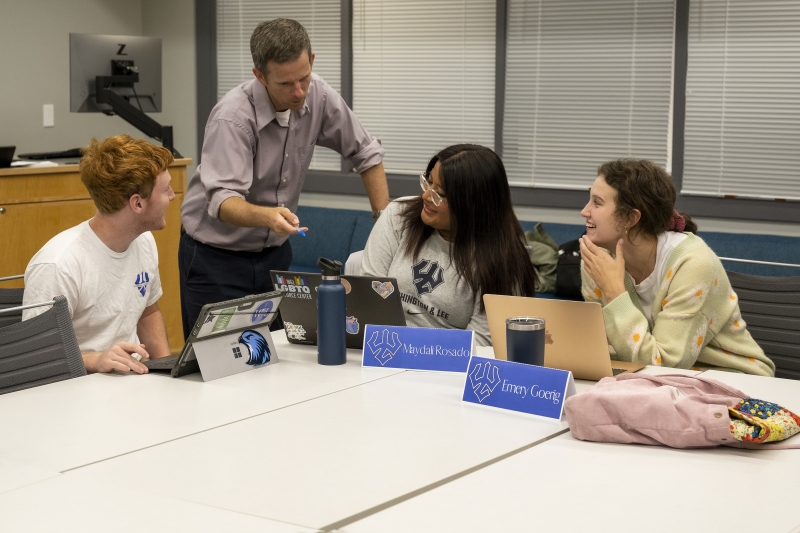The FYE 100 Advantage Students in FYE 100 benefit from collaboration from faculty, staff and students.
“This class is an awesome way to get to know the ins and outs of W&L and really make use of all the resources this university offers.”
~ Bella Timmerding ’26
The first year of college is a learning curve for even the most eager student. For incoming students at Washington and Lee University, the FYE 100: General Success course helps with the transition from high school to higher education.
The course is a peer-supported cohort that offers a weekly touchpoint during an incoming student’s first Fall Term at W&L. Topic-based discussions in each class meeting provide students with skills for academic success, including time management and academic support resources, as well as the opportunity for professional development, self-reflection and conversations with peers geared toward deepening a sense of community and belonging. Course topics correspond with discussions that all first years participate in with their residence halls during the term, ranging from wellness to diversity, equity and inclusion.
“Everything we do in FYE 100 comes back to those two concepts,” said Ronda Bryant, associate dean of students. “So we try to weave elements of those throughout every week.”
Bryant serves on the first-year experience team alongside Kim Hodge, associate dean of students; Jason Rodocker, associate dean of students and dean for first-year experience; and Mariel Potter, first-year coordinator. They collaborate on the development, implementation and evaluation of the FYE 100 curriculum with the 28 faculty-student teams who serve as program facilitators. The group meets weekly to brainstorm, share best practices and discuss real-time student feedback.
“The FYE 100 course provides the newest members of our community information, resources and the opportunity to share ideas and experiences both in and beyond the classroom,” said David Leonard, dean of student life. “Having the ability to reflect upon class topics while simultaneously experiencing them in the co-curricular environment is powerful with regard to student development.”
The course also presents personal and professional growth opportunities for upper-division student facilitators.
“In preparing for each class, I’m often asked to draw from my own experiences, so it’s really helping me reflect on my own experiences in college thus far,” said Jess Kishbaugh ’24, who co-facilitates an FYE 100 section with Rodocker. “I’m also learning a lot about collaboration and the give-and-take of classroom discussions from a whole different perspective.”
Rodocker emphasized that this shared learning experience is intentionally woven into the course preparation process, as well as the classroom experience.
“Faculty, Student Affairs and students working together to understand each other’s perspectives and experiences is role modeling the inclusive community that we want first-year students to experience,” Rodocker said.
Academic integrity, time management and accountability are focal points of the first half of FYE 100’s curriculum and are consistently identified by current upper-division students who have taken the course as the topics they most value when looking back on their time in the program.
“Professional development is important to first-years as well, but they don’t know it until after graduation,” Rodocker said. “FYE 100 connects first years to professional concepts such as communication etiquette, building a resume and writing a personal statement, in addition to creating an early relationship with the Office of Career and Professional Development (CPD).”
Last year, 95% of first-year students who took FYE 100 met with CPD, including 26% who met more than once, whereas only 18% of first-year students who did not take FYE 100 met with CPD.
“One of the most impactful resources I have learned about in this course is the Career and Professional Development office and the advising appointments offered,” said Bella Timmerding ’26. “I know if I need anything career-related at all, there is someone up there who has the same passions as me and who can help get me where I need to be. This class is an awesome way to get to know the ins and outs of W&L and really make use of all the resources this university offers.”
 Ronda Bryant, associate dean of students, teaches a section of FYE 100.
Ronda Bryant, associate dean of students, teaches a section of FYE 100. Jason Rodocker, associate dean of students and dean for first-year experience, gives FYE 100 student feedback on a group project.
Jason Rodocker, associate dean of students and dean for first-year experience, gives FYE 100 student feedback on a group project.
You must be logged in to post a comment.